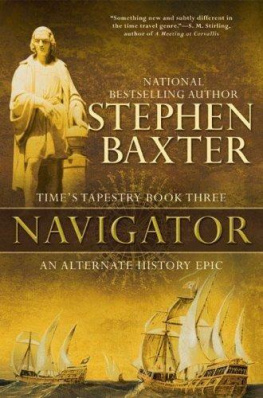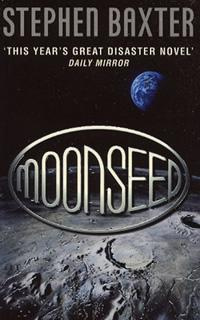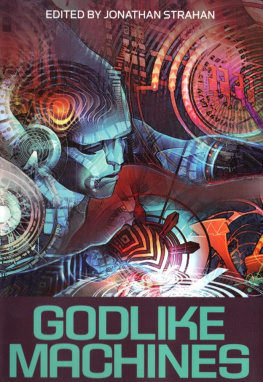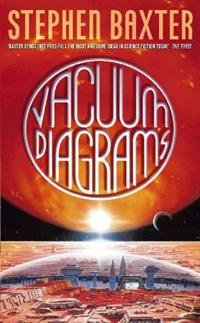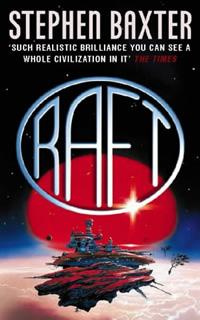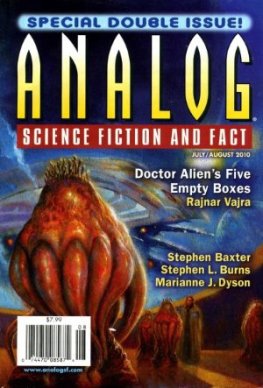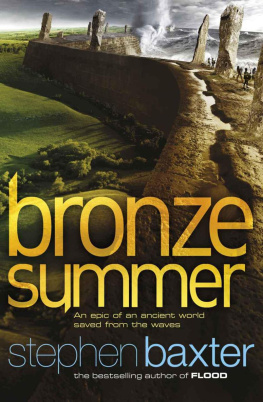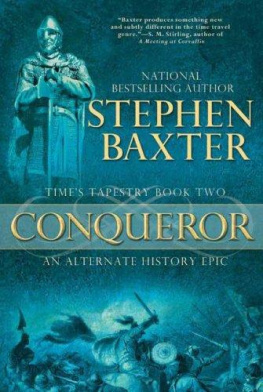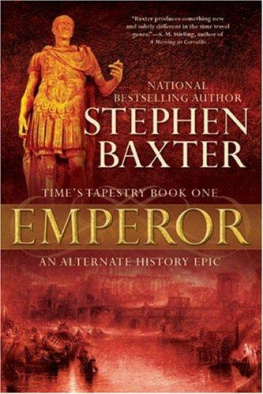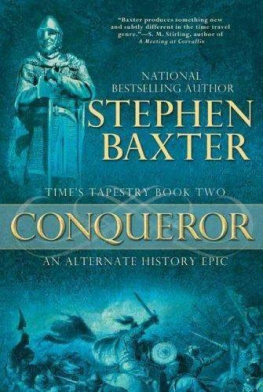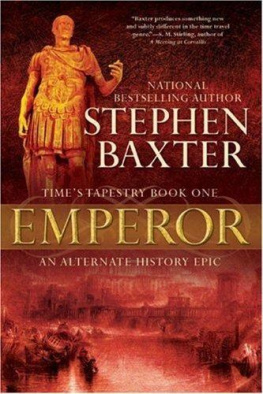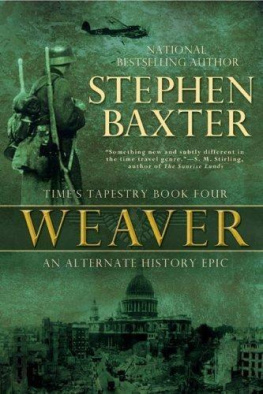Stephen Baxter
Navigator
The Testament of Eadgyth of York:
(Lines revealed in AD 1070)
In the last days
To the tail of the peacock
He will come:
The spider's spawn, the Christ-bearer
The Dove.
And the Dove will fly east,
Wings strong, heart stout, mind clear.
God's Engines will burn our ocean
And flame across the lands of spices.
All this I have witnessed
I and my mothers.
Send the Dove west! O, send him west!
(Lines revealed in AD 1481)
The Dragon stirs from his eastern throne,
Walks west.
The Feathered Serpent, plague-hardened,
Flies over ocean sea,
Flies east.
Serpent and Dragon, the mortal duel
And Serpent feasts on holy flesh.
All this I have witnessed
I and my mothers.
Send the Dove west! O, send him west!
The 'Indendium Dei' cryptogram:
(Source: the 'Engines of God' Codex of Aethelmaer of Malmesbury,
c. AD 1000)
BMQVK XESEF EBZKM BMHSM BGNSD DYEED OSMEM HPTVZ HESZS
ZHVH
PROLOGUE
AD 1070
Orm Egilsson was among the last to reach the village this bright February morning, and the place was already a ruin. The wooden houses had been set alight, the stone barns cracked open like eggs, the winter food robbed, the seed corn torched and the animals slaughtered or driven off, even the pregnant ewes and cattle.
And the bodies were everywhere. Men and boys had been cut down like blades of grass. Some of them had makeshift weapons in their hands, scythes and rakes, even pikes and rusty swords. They had been useless against Norman warriors. But these farmers had to fight, for there was no English army to fight for them, no English king since Harold had been destroyed at Hastings more than three years ago. And once the men had fallen the women and girls were kept for the Normans' usual sport. Orm looked away from the twisted bodies in their bloodied rags, the mud scuffed around them by the knees and feet of the soldiers.
It was like this all across the land. Whichever way Orm looked he saw smoke rising, plumes of it dominated by the tremendous column that rose up from York itself, a few miles away. It was the Normans' intention to ensure that this country could not support any more rebellion, not even the furtive pinpricks of the wildmen, not for a generation or more. And the Normans pursued such goals with relentless efficiency.
At a command from his officer Orm dismounted and tied his horse's rein to a burned stump. The job of the mop-up party was to ensure the work was finished thoroughly. The heat from the smouldering fires made Orm sweat inside his heavy chain-mail coat, and the sooty air was gritty under his conical helmet. But he prodded at charred ruins with a stabbing-sword and kicked over bodies with the rest of them. It wasn't as bad as taking part in the slaughter itself.
He came to one ruined hovel, actually a little Christian chapel, devoted, he saw from the remnant of a dedication stone, to Saint Agnes, a Roman martyr. Orm kicked away the debris of the fallen walls, exposing an earth floor covered with a layer of straw. Here was a hearth, the stones still warm from the night's fire, a couple of wooden chests already broken open. Nothing left of value.
But something moved under the straw, a rustle in the dirt. Perhaps it was a rat. He stepped that way.
And he heard a voice, a woman, softly, rapidly chanting English words:
In the last days
To the tail of the peacock
He will come
The spider's spawn, the Christ-bearer
The Dove.
And the Dove will fly east...
A prayer? Not one he knew - but as a pagan, he wouldn't expect to.
He stamped hard. His boot clattered, a hollow sound. The voice fell silent.
He kicked aside the straw and exposed planks, roughly cut. In the gaps between the planks he saw a flicker of movement, a flash of a blue eye.
Orm braced himself, his sword raised in the air, ready to stab down. But he hesitated, sick of blood. He leaned down, slipped his gloved fingers between the planks and pulled them up.
A woman huddled in the hole, dressed in a grimy black habit. She flinched from the light, her hands over her face. In the hole with her was a half-chewed loaf of hard winter bread, a wooden pitcher of water, and a discoloured patch of ground that, from its stink, told him she had been in here some hours.
He ought to finish her off. It would be kinder than to let the Normans have her. He hardened his grasp on the hilt of his sword.
She lowered her hands and looked at him. She had bright blue eyes, a round, sturdy face, short-cropped hair.
He gasped. 'Godgifu,' he said. And he lowered his sword.
The woman in the hole watched him, her gaze fixed on his face.
'But you are not Godgifu,' he said in English.
She thought that over. 'Are you sure?'
'You can't be. I saw her die.' No, his pitiless memory informed him. More than that. Orm had killed her, or his murderous machine of a body had, in the blood-lust on Senlac Ridge, during the slaughter men had come to refer to as the Battle of Hastings. Killed the woman he loved, without thinking. He had never forgiven himself, even though he had obtained absolution of a sort from Sihtric, Godgifu's priest-brother.
'Well, you're right. My name is Eadgyth. I wish I were your Godgifu, though.' Her voice was scratchy from disuse. She wasn't much older than twenty.
'Why do you wish that?'
'Because you would spare Godgifu. You will soon kill me.'
'Why are you here, Eadgyth?'
'I'm hiding.'
'From the Normans?'
'From the Normans, and my parents.'
'Why your parents?'
She shivered in her hole. 'I want to give my life to God. They want to give it to the Conqueror.'
He glanced around. The other troopers were busy with something they had found on the far side of the village, a cache of money, or a woman still alive. There was nobody near Orm, nobody watching. Orm squatted down, stiff in his grimy mail coat. 'Tell me.'
It was a familiar story. Under Harold and his predecessors Eadgyth's family had been land-owners, well-to-do. But more than three years after the Conquest, any vague intentions King William might have had for rapprochement with the old English aristocracy had been burned away by rebellion. All over the country there were wildmen operating from the woods and hills and marshland, places the heavily armoured Normans could not follow. The sons of dead King Harold had been raiding from Ireland. The Scottish King Malcolm had married his sister to Edgar the Atheling, the relative of Edward the Confessor who some argued had a better claim to the throne than even Harold had. And so on. As one rebellion after another was put down, very few of the native English nobility retained their positions.
Eadgyth's parents' intention was to survive under the new regime. And their main asset, as they saw it, was their only daughter.
'They brought me back from my convent. I was told I must marry the son of the Norman lord who now owns us. I met the boy. No more than seventeen. He tried to rape me before I told him my name. He's a bishop now.' She laughed, not bitter.
'So you ran away.'
'I've travelled from safe-house to safe-house, sheltered by the clergy and by the people of places like this.'
Orm had heard of this. For peasants stripped of custom and English law, hermits like Eadgyth were a reminder of the old days, the old English ways.
She said to him, 'And you-?'
Next page
